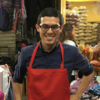
León Felipe Téllez Contreras
- Course: PhD in Human Geography
- PhD title: Trader Organisations and Traditional Urban Markets: The Political Production of Public Services and Public Spaces
- Nationality: Mexican
- Job title: PhD Researcher
- Company: University of Leeds
Why did you choose to study for a PhD at the University of Leeds?
I chose to study at the School of Geography Leeds because I found an amazing research environment formed by very friendly and committed supervisors and postgraduate researchers. In early 2016, when I first came to Leeds as part of the Contested Cities research network, I discovered the School of Geography, where critical interdisciplinary discussions were nurtured in a truly global environment. At that time, not only did I meet my current supervisors, but a wide number of international researchers exploring the complexities of urban life and change. This convergence of interests and people, along with the School’s facilities and the superb University libraries, convinced me that I should apply to pursue a PhD degree in Geography and enrich my background in Sociology and Social Anthropology. And thus I did that in October 2016, with the financial, administrative, and academic support of CONACyT, my Mexican sponsor, and the University of Leeds, I started what has been an enjoyable research journey.
Can you tell us about your research?
My research focuses on the socio-political dimension of urban infrastructure provision and transformation, which is a general topic that I came about with after exploring the economic and political life of some of the 70,000 traders in the 329 traditional indoor markets of Mexico City. In this sense, I am interested in the theoretical and empirical aspects that bridge the socio-political life and the infrastructures’ materiality of our cities. Since I am conducting an ethnographic research, my fieldwork entails examining how trader organisations participate in urban political networks that involve the production and transformation of these emblematic commercial spaces. For Mexico City, indoor markets have become political nodes that are brought together from tens to thousands of traders. My research aims at discussing critically some of the economic, social, cultural, and urban implications of negotiating in highly-unequal cities the regeneration or neglect of public services and public spaces. This is particularly urgent in relation to traditional indoor markets, since many of them are crucial for low-income people in terms of access to food and other basic products.
What is your favourite part of studying at Leeds?
I really enjoy studying at Leeds because of the friendly and committed research community the School has built. Since I arrived, I have only found open doors, attentive ears, and insightful conversations with all the people I have met, starting with my supervisors. In such a free and respectful academic context, my work has evolved with the help of thought-provoking questions and comments, and thanks to the very interesting and inspirational presentations both from human and physical geographers. All this makes the School of Geography an incomparable place to develop one’s research skills.
What activities do you take part in outside of your studies?
One of my favourite places at the University is the swimming pool, so I spend some time everyday at The Edge. It is simply a great thing to have such a good gym so close to the School. I also really enjoy the Yorkshire Dales or the outskirts of Leeds with some of my friends: amazing landscapes shared with your favourite people. I also take advantage of the wide range of places to socialise outside the university, which connect me with local life in many different ways.
What are your ambitions for the future?
I am pursuing an academic career that directly engages with the search of solutions to many of our social and urban problems. I think that the knowledge we produce and materialise in publications of any kind can contribute to improve our life in cities, especially the lives of those that fight everyday against the present inequalities.
Do you have any advice for prospective students?
If you are interested in human/ social geography or looking for a place where you can develop your research skills with the support of critically engaged scholars in an open, interdisciplinary environment, take a look at the School of Geography website, approach the students, and write to the academic staff to know more about what is going on in the school and how to apply.

